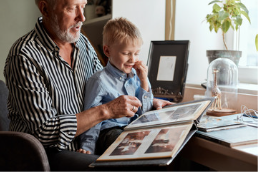What's happening?
After the death of someone special, you might begin to notice some emotions that you haven’t felt before. This might leave you confused and questioning how you should act. It is important to know that everybody reacts differently and whatever you’re feeling is okay. Below are some questions that people often ask.
Why does it hurt?
Grief (sadness after a death) is painful. It can affect your body, making you feel achy, ill or tired. It can also cause strong emotions and thoughts that worry you, leaving you feeling overwhelmed. This is common but the pain you are feeling will become easier to manage with time.
Why am I so angry?
It can feel very unfair when a loved one dies. You might feel angry that people don’t understand or that people should have done more to help. Note down some activities that you find relaxing or distract you. Try to switch to these activities when you start to feel angry.

What if I forget?
Over time you will begin to get used to new routines and the grief you felt might not feel as strong anymore. It’s also okay to have fun. It doesn’t mean you are ‘over it’, you don’t care, or you have forgotten. Try not to think of this as forgetting your loved one but adjusting to the changes in your life.
If you are worried about forgetting, collect items and write down things that remind you of your loved one, perhaps photographs, songs or stories they’ve told. Some people find it useful to keep a memory box to keep these items in one place.
Do I have to be strong for other people?
No. You might feel that you need to hide your feelings from family to avoid making them feel bad. It’s okay to show others that you are finding things difficult even though it might make you feel vulnerable. Crying can release tension and help you feel better. Remember, everyone is different - maybe you do not cry and that’s okay too.
Was it my fault?
It was not your fault that your loved one died. It’s natural to think that you could have done something more. Try to focus on the nice things that you said or did. Forgiving yourself is important.

Who can I talk to?
Even if you are keeping busy, grief can make you feel very lonely. There might be other changes happening at home which are affecting how available people seem to be. You might think that you do not want to bother your family because your worries are not as important. However, staying connected and sharing what you’re feeling can be a good way to support each other and you might find that they’re feeling the same way.
Think about different people you trust who you can share your thoughts with, for example teachers or friends who have been through grief themselves. It may not be easy, but try not to isolate yourself.
Apart of Me (app) - this is a game designed to help young people come to terms with the death of a loved one. It's for ages 11+ but if you are younger, you can ask an adult to play along with you.
The Headspace (app - free edition) - has 10 (10-minute) exercises allowing you to master the essentials of mindfulness.
MeeToo (app) - provides a safe and secure forum for teenagers wanting to discuss any issue affecting their lives. You can anonymously get advice from experts or other teenagers going through similar experiences.
Further support
- Childhood Bereavement UK
- Childhood Bereavement UK brings together guidance and information to support you at this difficult time.
- Call 0800 028 8840
- Cruse Bereavement Care
- Cruise Bereavement Care: Bereaved people may have to deal with increased trauma, and may be cut off from some of their usual support network. Those who are already struggling with bereavement, or whose relatives or friends die through other causes will also be affected
- Call 0808 808 1677
- Winston's Wish
- Winston’s Wish provides information, advice and guidance on supporting bereaved children and young people.

